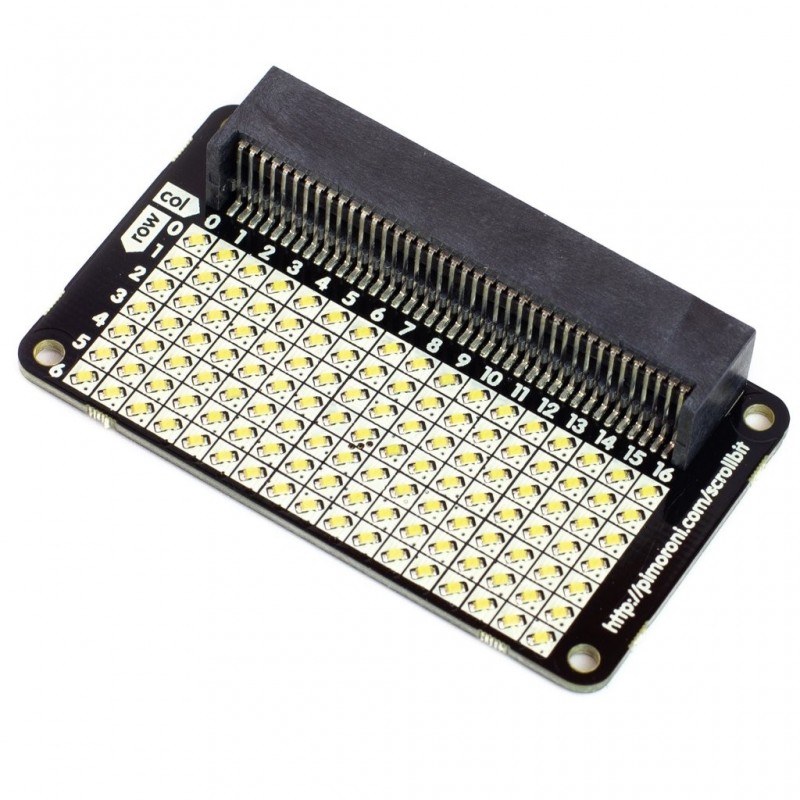

Module with 17x7 LED matrix display (119 LEDs) designed to work with micro:bit. It is based on the IS31FL3731 controller and communicates via the I2C interface. It is possible to individually control the brightness of each LED, making the module suitable for displaying simple animations, text and images. The display can be programmed using the Microsoft MakeCode block editor or the MicroPython - Mu code editor. Documentation with the library for MakeCode and MicroPython and examples is available in the GitHub repository. On the manufacturer's website there are also examples of projects using scroll:bit:
Manufacturer BTC Korporacja sp. z o. o. Lwowska 5 05-120 Legionowo Poland sprzedaz@kamami.pl 22 767 36 20
Responsible person BTC Korporacja sp. z o. o. Lwowska 5 05-120 Legionowo Poland sprzedaz@kamami.pl 22 767 36 20
Educational micro:bit module with 32-bit ARM Cortex-M4 microcontroller. Manufactured to interest the youngest in computer engineering. SparkFun DEV-17287
Starter kit with micro:bit v2. In addition to the micro:bit v2 board, the set includes a microUSB-USB cable, a battery basket and two AAA batteries. SparkFun DEV-17288
The module with a heart rate sensor and the SpO2 level dedicated to micro:bit. It is based on the MAX30102 chip and communicates via the I2C interface. SparkFun SEN-15271
Soil moisture sensor dedicated to micro:bit. It is supplied with the voltage from 3.3 V to 5 V and communicates via an analog signal. SparkFun SEN-15272
A module with an electret microphone, amplifier and ADC converter dedicated to micro: bit. It communicates via the I2C interface. SparkFun SEN-15289
Data logger dedicated to micro:bit. It connects to the module via the UART interface and allows you to save data on a microSD card. SparkFun DEV-15270
Module with the real time clock (RTC) RV-3028 dedicated to micro:bit. It communicates via the I2C interface. SparkFun SEN-15486
The power module is designed to work with BBC micro:bit boards. It is equipped with a buzzer and a CR2032 battery socket. Kitronik 5610-V2
Transparent protective case designed for micro:bit educational modules. SparkFun PRT-17867
A set for building a smartwatch based on the micro: bit educational module. It consists of an expansion board and a strap
Set of "sleeping lion" with the educational module micro: bit. It consists of a main plate, noise: bit and felt elements, thread and needle to create the toy. Pimoroni PIM363
Module with 17x7 LED matrix display (119 LEDs) designed to work with micro:bit. It uses the IS31FL3731 driver and communicates via the I2C interface. Pimoroni PIM353
A module with a set of environmental sensors (pressure, temperature and humidity sensor, light sensor, MEMS microphone) designed for micro:bit. Pimoroni PIM355
Expansion module compatible with micro:bit. The board is equipped with a 24 V 2 A relay, two buffer inputs, two sink outputs and three analog inputs with a working range up to 24 V. Pimoroni PIM371
Audio module with loudspeaker designed to work with micro:bit. There is an amplifier and an 8 Ω 2 W speaker on the board. Pimoroni PIM356
The module with six touch buttons and LED diodes is designed for micro:bit. It uses the CAP1166 driver and communicates via the I2C interface. Pimoroni PIM401
The IO expansion module is designed to work with the micro: bit educational board. There are 19 IO pins on the board, a buzzer and a voltage stabilization circuit are placed. DFRobot MBT0008
Extension module with a breadboard designed for micro:bit. There are male and female connectors with all IO pins. A great solution for prototyping. DFRobot MBT0009

Module with 17x7 LED matrix display (119 LEDs) designed to work with micro:bit. It uses the IS31FL3731 driver and communicates via the I2C interface. Pimoroni PIM353
